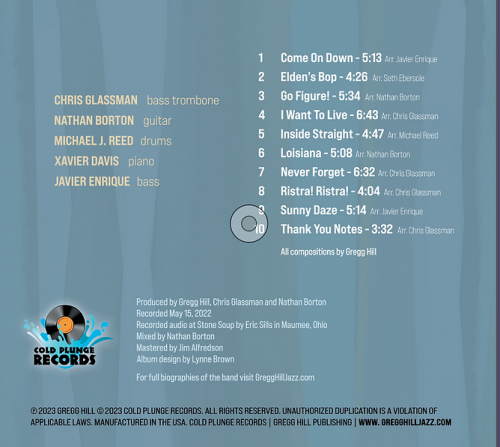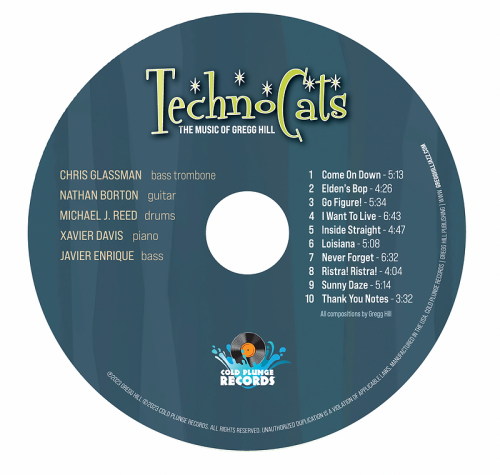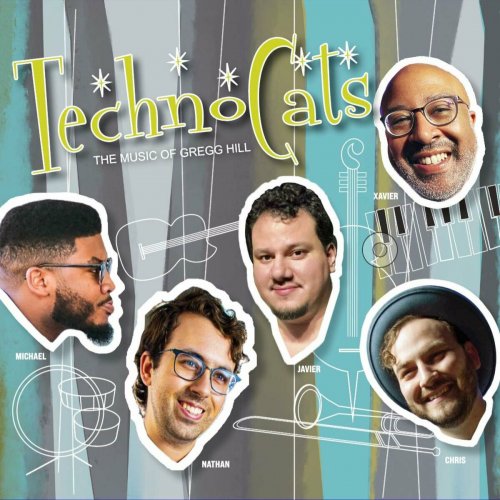
Technocats - Technocats The Music of Gregg Hill (2023)
BAND/ARTIST: Technocats
- Title: Technocats The Music of Gregg Hill
- Year Of Release: 2023
- Label: Cold Plunge Records
- Genre: Jazz
- Quality: FLAC (tracks)
- Total Time: 51:07 min
- Total Size: 303 MB
- WebSite: Album Preview

Tracklist:
1. Come On Down - 5:13 (Arr. Javier Enrique)
2. Elden's Bop - 4:26 (Arr. Seth Ebersole)
3. Go Figure! - 5:34 (Arr. Nathan Borton)
4. I Want To Live - 6:43 (Arr. Chris Glassman)
5. Inside Straight - 4:47 (Arr. Michael Reed)
6. Loisiana - 5:08 (Arr. Nathan Borton)
7. Never Forget - 6:32 (Arr. Chris Glassman)
8. Ristra! Ristra! - 4:04 (Arr. Chris Glassman)
9. Sunny Daze - 5:14 (Arr. Javier Enrique)
10. Thank You Notes - 3:32 (Arr. Chris Glassman)

In the U.S jazz scene where the east and west coasts are considered king, not everyone is aware of the other smaller regional scenes that are home to huge pockets of talent. Although Detroit has long been recognized as a Midwest epicenter of jazz, from which many legendary players have emerged, the adjacent East Lansing, Michigan, should also be acknowledged for its notable pool of players, many of which have ties in some way to the fantastic jazz studies program at Michigan State University. All members of this group have the MSU connection.
Guitarist Nathan Borton and trombonist Chris Glassman lead the group. MSU Professor of Jazz Xavier Davis is featured on piano. Michael J. Reed (drums) and Javier Enrique (bass) round out this fine ensemble of players. The release encapsulates the spirit of two different generations in this way.
Gregg Hill, composer and co-producer of the album, has long ties to the MSU jazz scene. Having produced multiple albums with MSU professors Rodney Whitaker and Randy Napoleon, Hill has long been involved as a jazz fan and patron and in the last several years as a jazz composer and record producer.
Technocats takes its name from the title of one of Hill's tunes. The tune (unrecorded on this session) took its inspiration from nights enjoying bebop cutting contests between the young players at local gigs. That concept became the formative force in this band, which features some of Gregg's favorite young players on the scene to tackle his original music.
Guitarist Nathan Borton, a past disciple of Randy Napoleon, brings a hard driving and directed tone to all the selections. Where other players might resort to fast flurries of notes for the purposes of flash, Borton always keeps it tasteful and in the pocket throughout. Right out of the gate, Technocats establishes itself as a hard swinging and authoritative release.
"Come on Down" features Glassman's full bass trombone punctuating low notes and a tasteful upright bass solo from Enrique. The bright tempo of "Elden's Bop" is supported by a tasteful groove by Reed, and a vamp between two suspended chords helps balance the tension of the active chord changes. "Go Figure" provides further variety with a contrast to swing, and a more urban or neo-soul vibe. The interplay between Reed and Davis is strong on this cut, the solo supported beautifully by Glassman's bass trombone. After Davis's expansive but brief solo intro on "I Want To Live, " the group returns to swing with a cool melodic delivery by Borton and Glassman recalling classic Blue Note records by Horace Silver or Herbie Nichols. The straight-eights feel and Latin treatment of "Inside Straight" is a welcome contrast. This track delivers a more modern and searching vibe during the solo section concluding with Reed's powerful drum solo and the return to the theme.
"Loisiana, " written for Gregg's wife Lois, is rendered in playful swing, with two of the most narrative solos on the record from Borton and Davis. "Never Forget, " originally written for the tragedy of 9/11, opens with an appropriately dark and contemplative intro by bassist Enrique. Lyrical guitar, underpinned by trombone counterpoint dance over a searching fast three or 6/8 feel. The buoyant straight eighths feel of "Ristra! Ristra!" and the syncopated pattern from Enrique, deliver a tapestry for the melodic interplay between Borton and Glassman to unfold, echoed by Davis's rich and
articulate voicings.
Beginning just as an introspective duo between Davis and Borton, "Sunny Daze, " opens up into a Reed drum solo section, followed by an ensemble theme recalling Branford Marsalis's quartet. The Technocats deliver a swinging harp bop feel during the solos, featuring Glassman and Borton trading figures. Davis makes stylistically logical references, always beautifully in the service to the tune. The only ballad on the album, "Thank You Notes, " closes the set with singing guitar from Borton and Glassman's harmonizing bass trombone, supported by Davis's sprinkling of choice colors around the melody.
The entire release cements Gregg Hill's reputation not only as an excellent jazz composer but also as a producer. The variety of rhythmic feels make the quartet cover a lot of emotional flavors. Although grounded firmly in classic straight ahead mid-century jazz styles, it is music designed for contemporary times. It makes the listener ponder if maybe one day Hill's tunes could become standards–that young Technocats might continue to play at jams in East Lansing, seeking something fresh for the year rather than another overplayed standard.
Guitarist Nathan Borton and trombonist Chris Glassman lead the group. MSU Professor of Jazz Xavier Davis is featured on piano. Michael J. Reed (drums) and Javier Enrique (bass) round out this fine ensemble of players. The release encapsulates the spirit of two different generations in this way.
Gregg Hill, composer and co-producer of the album, has long ties to the MSU jazz scene. Having produced multiple albums with MSU professors Rodney Whitaker and Randy Napoleon, Hill has long been involved as a jazz fan and patron and in the last several years as a jazz composer and record producer.
Technocats takes its name from the title of one of Hill's tunes. The tune (unrecorded on this session) took its inspiration from nights enjoying bebop cutting contests between the young players at local gigs. That concept became the formative force in this band, which features some of Gregg's favorite young players on the scene to tackle his original music.
Guitarist Nathan Borton, a past disciple of Randy Napoleon, brings a hard driving and directed tone to all the selections. Where other players might resort to fast flurries of notes for the purposes of flash, Borton always keeps it tasteful and in the pocket throughout. Right out of the gate, Technocats establishes itself as a hard swinging and authoritative release.
"Come on Down" features Glassman's full bass trombone punctuating low notes and a tasteful upright bass solo from Enrique. The bright tempo of "Elden's Bop" is supported by a tasteful groove by Reed, and a vamp between two suspended chords helps balance the tension of the active chord changes. "Go Figure" provides further variety with a contrast to swing, and a more urban or neo-soul vibe. The interplay between Reed and Davis is strong on this cut, the solo supported beautifully by Glassman's bass trombone. After Davis's expansive but brief solo intro on "I Want To Live, " the group returns to swing with a cool melodic delivery by Borton and Glassman recalling classic Blue Note records by Horace Silver or Herbie Nichols. The straight-eights feel and Latin treatment of "Inside Straight" is a welcome contrast. This track delivers a more modern and searching vibe during the solo section concluding with Reed's powerful drum solo and the return to the theme.
"Loisiana, " written for Gregg's wife Lois, is rendered in playful swing, with two of the most narrative solos on the record from Borton and Davis. "Never Forget, " originally written for the tragedy of 9/11, opens with an appropriately dark and contemplative intro by bassist Enrique. Lyrical guitar, underpinned by trombone counterpoint dance over a searching fast three or 6/8 feel. The buoyant straight eighths feel of "Ristra! Ristra!" and the syncopated pattern from Enrique, deliver a tapestry for the melodic interplay between Borton and Glassman to unfold, echoed by Davis's rich and
articulate voicings.
Beginning just as an introspective duo between Davis and Borton, "Sunny Daze, " opens up into a Reed drum solo section, followed by an ensemble theme recalling Branford Marsalis's quartet. The Technocats deliver a swinging harp bop feel during the solos, featuring Glassman and Borton trading figures. Davis makes stylistically logical references, always beautifully in the service to the tune. The only ballad on the album, "Thank You Notes, " closes the set with singing guitar from Borton and Glassman's harmonizing bass trombone, supported by Davis's sprinkling of choice colors around the melody.
The entire release cements Gregg Hill's reputation not only as an excellent jazz composer but also as a producer. The variety of rhythmic feels make the quartet cover a lot of emotional flavors. Although grounded firmly in classic straight ahead mid-century jazz styles, it is music designed for contemporary times. It makes the listener ponder if maybe one day Hill's tunes could become standards–that young Technocats might continue to play at jams in East Lansing, seeking something fresh for the year rather than another overplayed standard.
Year 2023 | Jazz | FLAC / APE
As a ISRA.CLOUD's PREMIUM member you will have the following benefits:
- Unlimited high speed downloads
- Download directly without waiting time
- Unlimited parallel downloads
- Support for download accelerators
- No advertising
- Resume broken downloads


